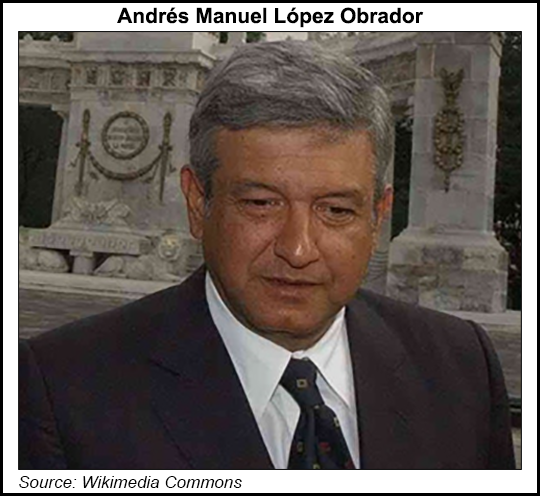NGI Archives | NGI All News Access | NGI Mexico GPI | NGI The Weekly Gas Market Report
Leading Mexican Presidential Election Candidate Unlikely to Reverse Country’s Energy Reform
With less than three weeks to go before Mexico’s July 1 presidential election, almost all the opinion polls predict Andres Manuel Lopez Obrador as a surefire winner.

If all goes well for Lopez Obrador and his Morena party, he could be the first democratically elected left-wing president of Mexico since one-party rule ended in 2000.
That scenario, of course, is very unlikely to be realized. There are plenty of examples in recent years of opinion polls in various parts of the world that have turned out to baffle the pundits.
Some commentators have portrayed the Mexican election as a Gunfight at the O.K. Corral between supporters of President Enrique Pena Nieto’s energy reform and Lopez Obrador, formerly its fiercest opponent.
Nothing of the sort has happened, and thank goodness for that, say several influential analysts.
Pablo Zarate, director of information for the Pulso Energetico think tank, told NGI that the idea of a major conflict over the reform is very mistaken.
“The people who are advising Lopez Obrador on the economy have made clear that there is no plan at all to reverse the reform,” Zarate said. “Lopez Obrador has insisted on reviewing the contracts that have been signed but that’s not a problem. Everything is transparent.”
But what about complaints over gasoline price increases — known in Mexico as “gasolinazos”?
Pulso Energético, which is supported by Amexhi, the Mexican private-sector Association of Hydrocarbon Companies, has nothing to do with the taxes imposed on retail prices of oil and gas. That’s the government’s job, Zarate said.
He might also have added that gasoline in Norway costs significantly more than it does in Mexico. Both countries are crude producers but Norway imposes very high taxes on its gasoline in order to invest in public transport and social services.
Arguments such as these have not, however, won favor with the Mexican public, said Arturo Carranza, analyst of Mexico’s National Institute of Public Administration.
“The energy ministry has explained that the taxes on gasoline are to help the government to meet its obligations to society, but there are plenty of people who don’t seem to get it,” Carranza said.
“I’m supposing that Lopez Obrador’s pragmatic approach toward the energy reform has won over the more radical elements in his Morena party,” Carranza said, noting that Pena Nieto’s education reform would be officially reversed under Lopez Obrador’s government program.
The Morena view on oil is to increase government investments in Petroleos Mexicanos (Pemex), said Carranza. “That probably means more upstream alliances with the private sector and much bigger presence in refining and petrochemicals,” he added.
Despite the predictions of the current polls, it has to be remembered that Lopez Obrador appeared to be a surefire winner in the 2006 election, and for a time looked like snatching a victory over Pena Nieto in 2012. On both occasions he shot himself in the foot by breaching the political etiquette of a nation still emerging from seven decades of reverence to all-powerful — and apparently invincible — politicians who never had to face an unruly electoral crowd.
Many say the fatal sin that caused Lopez Obrador the 2006 campaign was to tell Calderón: “Shut up, chachalaca!”
A chachalaca is a sort of road-runner with an ear-splitting cry.
Not the most eloquent of insults, but arguably not as offensive as some of the barbs that Winston Churchill used to launch against his political opponents.
© 2024 Natural Gas Intelligence. All rights reserved.
ISSN © 1532-1231 | ISSN © 2577-9877 | ISSN © 2577-9966 | ISSN © 1532-1266 |
